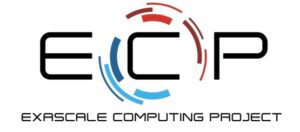Advanced Computing, Mathematics and Data
Research Highlights
September 2016
Launching a New Era for NWChem
PNNL-developed computational chemistry code set to grow under new ECP project
Recently, a PNNL-led proposal, NWChemEx: Tackling Chemical, Materials and Biomolecular Challenges in the Exascale Era, was selected as a four-year project for the national Exascale Computing Project, known as ECP. The NWChemEx project will enhance the popular computational chemistry code, NWChem, to dramatically improve its scalability, performance, extensibility, and portability to take full advantage of exascale computing technologies.

Dunning will lead a group with a proven track record of working together to manage a successful, major software development effort, notably NWChem.
Dr. Thom Dunning, a Battelle Fellow with the University of Washington-PNNL Northwest Institute for Advanced Computing, is Project Director for the NWChemEx project. Along with Theresa Windus (Deputy Project Director, Ames) and Robert Harrison (Chief Architect, Brookhaven), he will oversee a team of computational chemists, computer scientists, and applied mathematicians from partner institutions Ames, Argonne, Brookhaven, Lawrence Berkeley, Oak Ridge, and PNNL national laboratories, as well as Virginia Tech. Notably, much of the team, which includes the Environmental Molecular Sciences Laboratory NWChem Software Group, was integral in steering the original NWChem package through the tera- and peta-scale computing eras.
The NWChemEx project will redesign the architecture of NWChem to work with the pre-exascale and exascale computers to be deployed at U.S. Department of Energy Leadership Computing Facilities and the National Energy Research Scientific Computing Center. Initially, NWChemEx will target developing high-performance computational models for the production of advanced biofuels and other bioproducts—a highly important DOE mission need driven by energy and climate issues.

“NWChemEx will provide the foundation for the next-generation molecular modeling package,” Dunning explained. “While we are beginning with a focus on the molecular processes involved the development of stress-resistant biomass crops and efficient catalytic conversions of biomass-derived materials, NWChemEx has the potential to contribute to a much broader range of mission-critical challenges, including modeling the properties of water and aqueous solutions; understanding sequestration, transport, and cycling of energy byproducts in the environment; developing a predictive science of synthesis; and understanding the metabolism of plants and microbes, to name only a few possibilities.”
As part of the project, NWChemEx will be openly released annually (after Year 1) with complete user documentation and tests.
About ECP
In response to the National Strategic Computing Initiative, a cohesive, multi-agency strategic vision and federal investment strategy in high-performance computing initiated by Presidential Executive Order in 2015, the ECP was launched as a joint Office of Science/National Nuclear Security Administration partnership to address science and national security missions. It includes activities required for delivery of the exascale computing capability. ECP’s 10-year plan is structured in four focus areas: application, software, and hardware technology and exascale systems.
Related
